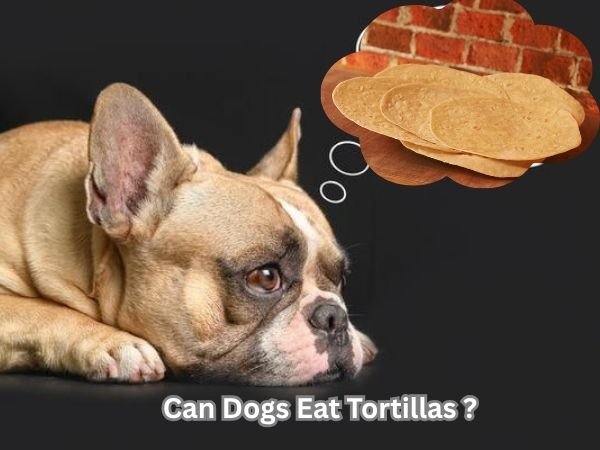
Can dogs eat tortillas? While tortillas are a handy source of carbs and fiber for people, dogs have different nutritional needs. Many tortillas have too much salt or added seasonings that are not safe for pets. Even plain tortillas do not offer any real benefits for dogs and just add extra calories.
The short answer is to be careful. Do not give your dog any kind of tortilla until you know the facts about ingredients, portion sizes, and what vets recommend.
Read the full guide to learn why tortillas are not a good choice for dogs, the top five reasons to avoid them, and what steps to take if your dog has already eaten one. Even small amounts can be risky depending on the ingredients and how often your dog eats them, so it is important to make informed choices.
What Are Tortillas Made Of?
Corn tortillas are made with masa harina, water, and salt. Flour tortillas use wheat flour, water, salt, and sometimes oil or lard. Store-bought tortillas often have preservatives and extra seasonings to help them last longer and taste better. If you are deciding between flour and corn tortillas for your dog, keep in mind that corn tortillas are gluten-free. Flour tortillas have more fat and gluten, which can be a problem for dogs with sensitivities.
Can Dogs Eat Tortillas?
Plain tortillas—both corn and flour—are not toxic to dogs and can be safe in small amounts. However, they don’t offer any real nutritional value and are high in carbs and calories. Regular feeding can lead to weight gain or upset tummies. Store-bought tortillas could also contain preservatives and excess salt, which aren’t great for dogs. Treating dogs with tortillas occasionally is okay, but they’re best kept as a rare human food snack—not a regular treat.
5 Risks of Feeding Tortillas to Dogs
Can Dogs Eat Tortillas? It might seem harmless to share a piece of tortilla from your plate with your dog, but there are a few reasons to be careful. Tortillas are not toxic, but they do have some risks that dog owners should know about.
1.Excessive Calories Lead to Weight Gain
Tortillas have more calories than you might think, and they do not give dogs any real nutrition. If you add treats like tortillas to your dog’s usual food, the extra calories can add up fast. Treats should only make up about 10% of your dog’s daily calories. If you go over that, your dog could gain weight. Extra weight is not just about looks. It can lead to health problems like obesity, diabetes, and heart disease. If your dog needs to watch their weight, there are much better snack choices than tortillas.
2.High Sodium Content Causes Health Problems
A lot of store-bought tortillas have more salt than you might expect, and this is not good for dogs. Too much salt can upset your dog’s stomach and may cause dehydration, especially if they do not have fresh water. Salt does not help dogs and can even raise their heart rate or cause heart problems over time. Even a small piece of tortilla can have more salt than your dog needs.
3.Dangerous Seasonings and Preservatives
Tortillas are processed foods, so they often have additives and preservatives that are not good for dogs. Some flavored tortillas have things like garlic, which is poisonous to dogs. Store-bought tortillas usually have preservatives to make them last longer, but these do not help your dog’s health. If you do give your dog a piece of tortilla, make sure it is plain and does not have any extra flavors or spices.
4.Potential Allergic Reactions
Although relatively uncommon, some dogs have gluten intolerance or food allergies that make flour tortillas particularly problematic for them. Dogs don’t process grains the same way humans do, and those with sensitivities may experience uncomfortable symptoms after eating tortillas. Signs of an allergic reaction can include vomiting, diarrhea, skin sensitivities, itching, or even weight loss. Dogs with existing stomach troubles or wheat allergies should avoid tortillas entirely, as they may experience significant discomfort.
5.Risky Fillings and Toppings
Most people eat tortillas with fillings like cheese, avocado, salsa, chicken, or eggs. If your dog grabs a tortilla from your plate or the counter, it might have something inside that is not safe. Avocado can be toxic to dogs, and many salsas have onions or garlic, which are also harmful. Even cheese adds extra fat and calories that your dog does not need.
Can Dogs Eat Tortilla Chips?
Can Dogs Eat Tortillas? If you drop a tortilla chip on the floor during movie night, you might wonder if it is safe for your dog to eat it. One or two chips will not harm your dog, but tortilla chips are not a healthy snack and should not be a regular treat.
What’s Actually in Tortilla Chips?
Tortilla chips are made from corn, vegetable oil, and salt. These ingredients are not poisonous to dogs, but the amounts are the problem. Most chips are fried, so they are high in fat, and they have a lot of salt that dogs do not need. Some flavored chips have onion or garlic powder, which are toxic to dogs and can cause serious health problems.
Health Risks to Watch For
- High sodium content can lead to excessive thirst, dehydration, and, in large amounts, even sodium poisoning with symptoms like vomiting and tremors.
- Fatty ingredients may trigger pancreatitis, a painful inflammation of the pancreas.
- Sharp edges can injure a dog’s mouth, throat, or digestive tract, especially if they gulp down larger pieces.
- Empty calories contribute to weight gain and obesity, providing no nutritional benefits.
Instead of tortilla chips, you can give your dog carrot sticks, apple slices, green beans, or plain air-popped popcorn with no salt. These snacks are crunchy and much better for your dog’s health.
Risks of Feeding Flour Tortillas to Dogs
Can Dogs Eat Tortillas? Flour tortillas might look harmless, but they can cause problems for dogs. They are not toxic, but they do not give your dog any real nutrition and can lead to health issues if you feed them often or in big amounts.
Empty Calories Lead to Weight Gain
Flour tortillas are surprisingly high in calories despite their flat appearance. When treats make up more than 10% of a dog’s daily caloric intake, weight gain becomes a real concern. Those extra pounds can trigger chronic health issues, making it important to keep tortilla portions very small and infrequent.
Gluten Sensitivities and Allergies
Some dogs have gluten intolerance or wheat allergies, but this is not very common. Flour tortillas have gluten, which can cause allergies like itchy skin, ear infections, vomiting, or diarrhea. If your dog is sensitive to gluten, corn tortillas are a safer choice because they do not have gluten.
High Sodium Content
Many store-bought tortillas have a lot of salt, which is not good for dogs. Too much salt can upset your dog’s stomach and may cause dehydration, especially if they do not have fresh water.
Dangerous Ingredients and Fillings
Store-bought tortillas often have preservatives and additives that are not healthy for pets. Flavored tortillas can have toxic ingredients like garlic or onion powder. Common fillings like avocado, salsa, or seasoned meats can also be dangerous for dogs.
What to Do If Your Dog Eats a Tortilla
Can Dogs Eat Tortillas? If your dog ate a tortilla, there is no need to panic. Tortillas are not toxic to dogs, but they are not a healthy snack. Here is what you should do next.
Stay Calm and Assess
Start by determining how much your dog ate and what type of tortilla it was. A small amount of plain tortilla is unlikely to cause problems. If your dog ate several tortillas or one with fillings such as garlic, onions, or spicy foods, monitor more closely.
Monitor for Symptoms
Monitor your dog for the next 24 hours. Watch for these signs:
- Vomiting or diarrhea
- Upset stomach or gas
- Excessive thirst (from salt content)
- Lethargy or behavior changes
- Allergic reactions, such as itching or skin irritation
When to Call the Vet
Can Dogs Eat Tortillas? Call your veterinarian if your dog shows symptoms or ate a large amount. This is especially important if the tortilla had garlic, onions, or if your dog has a wheat allergy. Most dogs recover without issues, but it is best to check with your vet if you are unsure.
Prevention Tips
Keep tortillas in containers or cabinets that your dog cannot access. If you offer a tortilla as a treat, use only small, plain pieces without added butter, salt, or seasonings. For dogs with gluten sensitivities, corn tortillas are usually a better choice than flour tortillas.
Healthier Alternatives to Share With Your Dog
Can Dogs Eat Tortillas? If you want to share snacks with your dog, choose foods that are safe and nutritious. Many human foods, including tortillas and processed snacks, are not ideal for dogs. There are healthier options you can offer instead.
Fresh Fruits for Happy Tails
Fruits can be good treats for dogs. Apples provide vitamins A and C and fiber, but remove the core and seeds before serving. Blueberries contain vitamins C and K and antioxidants. Bananas offer potassium and vitamin C, but are higher in sugar, so only give small amounts. Watermelon is hydrating and safe in moderation.
Crunchy Vegetables for Clean Teeth
Vegetables are low in calories and provide important nutrients. Carrots can help clean teeth and supply beta-carotene. Serve them raw or cooked. Green beans, cucumbers, and celery are also good options. Cooked sweet potatoes and plain pumpkin are higher in fiber and vitamins and are gentle on digestion.
Protein-Packed Options
Plain, cooked chicken is a lean protein that is easy for most dogs to digest. Cooked, unseasoned eggs provide protein and vitamins A, B, D, and K, as well as minerals like selenium and calcium. Unsweetened plain yogurt contains probiotics that support digestion.
Important Reminders
Always introduce new foods gradually and in small amounts. Keep everything plain and unseasoned—no salt, butter, or spices. Remove any seeds, pits, or bones that could pose choking hazards. These treats should complement, not replace, regular dog food, keeping tails wagging and bodies healthy.
Conclusion
Can Dogs Eat Tortillas? Dogs can eat small amounts of plain tortilla, but it should not be a regular part of their diet. Tortillas are not a nutritious food for dogs and should only be given occasionally.
What to Remember
Here are the essential points to keep in mind when it comes to dogs and tortillas:
- Moderation matters: A small piece now and then is fine, but don’t make it a habit. Tortillas are high in carbs and calories, which can lead to weight gain over time.
- Plain is best: Skip the seasoned varieties, as they may contain harmful ingredients like garlic or onion powder that are toxic to dogs.
- Watch the salt: Many store-bought tortillas have added sodium, which can cause dehydration and other health issues in dogs.
- Check for allergies: Some dogs may be sensitive to wheat or corn, so monitor for any digestive upset or skin reactions after feeding.
- Skip the fillings: Tortillas are rarely eaten plain, but ingredients like avocado, salsa, or cheese can be dangerous for your furry friend.
Can Dogs Eat Tortillas? Tortillas provide little nutrition for dogs and are mostly empty calories. For healthier treats, choose foods made for dogs and suited to their dietary needs.
FAQ
Can dogs eat tortillas safely?
Dogs can eat a small piece of plain tortilla, but it’s not healthy for them. Most tortillas contain salt, preservatives, or flour that can upset your dog’s stomach and add unnecessary calories.
Are corn tortillas better for dogs than flour tortillas?
Corn tortillas are slightly safer because they’re easier to digest, but they still have too much salt and carbs for dogs. Both types should only be an occasional treat, not a regular part of your dog’s diet.
What happens if my dog eats too many tortillas?
Eating too many tortillas can cause gas, bloating, or weight gain in dogs. In some cases, the high sodium and carbs can lead to long-term health problems like obesity or digestive issues.
Can dogs eat tortilla chips?
No, dogs should not eat tortilla chips. They are high in salt, oil, and sometimes flavored with seasonings like garlic or onion, which are toxic to dogs and can harm their health.
What are safe alternatives to tortillas for dogs?
Instead of tortillas, offer your dog plain cooked vegetables, rice cakes with no salt, or dog-friendly treats. These options are healthier, easier to digest, and safer for your dog’s overall well-being.



